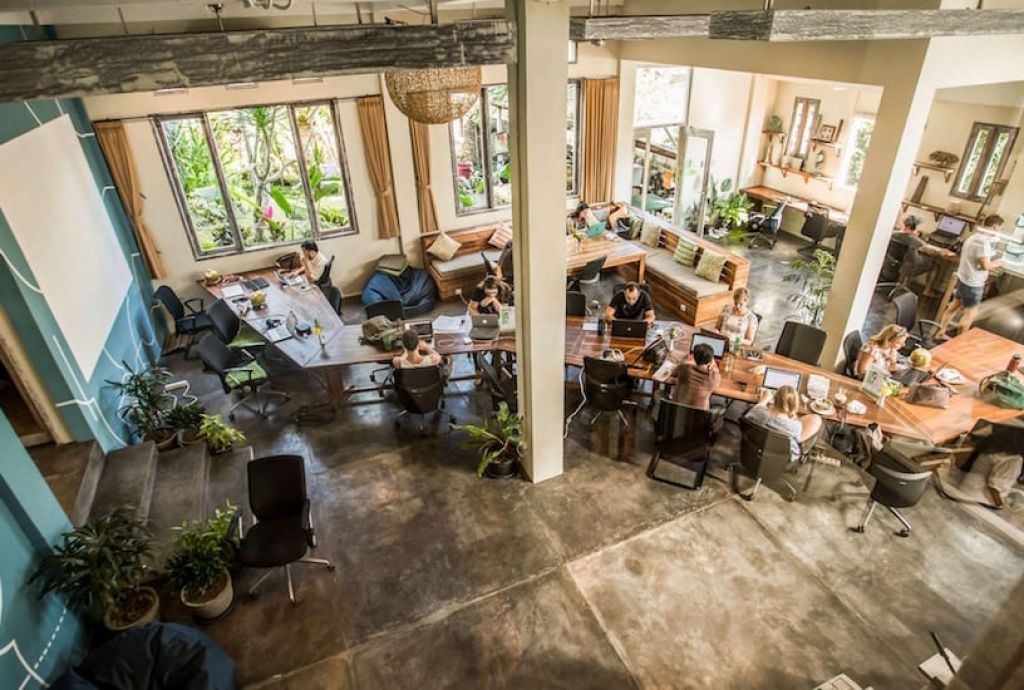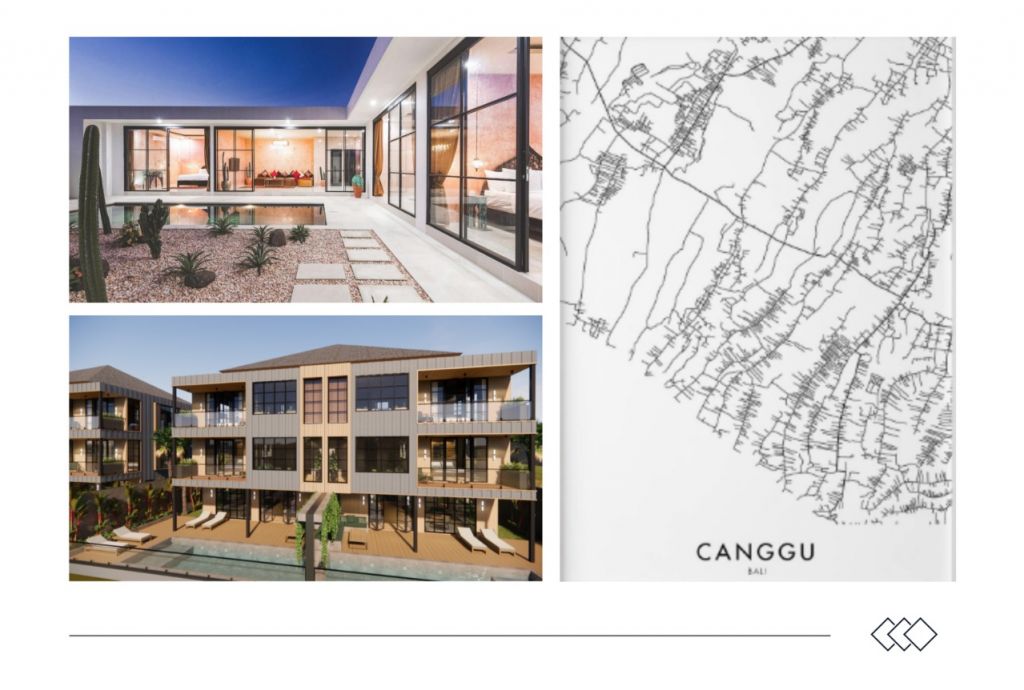
Co Working Space Business in Bali

Villas and hotels that sprung up like crazy mushrooms in Bali will soon have competitors: co-working spaces, startup businesses, idea incubators, and changemaker powerhouses (or all of them in one package), whose growth will be equally rapid if not more. They, I believe deserve a very warm welcome.
Just recently, BBC published an interesting article that captures the premiering efforts of making Bali, not only a tourist’s paradise as it has been but nerds’ too. And why not? Let’s take a look at the possibility.
A hi-tech center in the middle of rice fields is a great concept, no? So place-wise, this will only push the hype even further.
The idea of working anywhere, anytime on a daily basis is too hard to resist, especially for those who’ve spent their time working in a cubicle day in, day out. This idea is corroborated by the recent year’s trend in which it has been suggested that flexibility (in terms of place and time) can boost productivity and good results and everything those qualities entail. If Google even allows its employees to book Regus (or another co-working space) to host a team meeting or something, I think it’s safe enough to say that that suggestion has merit.
If the idea of working wherever you like and whenever you like, not bound to the 9-to-5 rule isn’t convincing enough, I don’t know what is.
The corporate environment is on the brink of dying, people!
Why Bali is a Perfect Place for a Co-Working Space
The rising of the mobile workforce (as opposed to corporate ones) is a real phenomenon and it’s unprecedented in history. Thanks to the technology we have today, there are more and more people living happy and more prosperous by being self-employed or relying on freelance jobs than ever.
Bali attracts more and more people within a productive age, each with skills, educational background and certainly a fresh idea to bring to the big idea pool. There have to be enough places to accommodate those creative freelancers, programming wizards or other on-vacation professionals and businesspersons among millions of people who visit Bali each year. If everything is done right, it really just a matter of time until Bali grows into, as this article say, the epicenter for a startup business.
Bali can even bring something that you can’t find easily in other co-working places all around the world, even the most-established one (unless it’s located within the UN Headquarters in New York), namely to work in a cross-nationalities environment. This article list in brief why Bali is a perfect place to startup.
The Perks of Utilizing Co-Working Space
As someone who had spent more than 5 years as a self-employed, operating from a small working station in a small boarding house–a tiny room where I also sleep, eat and live with my girlfriend (now wife)–I know how precious it is to have a chance to interact with other people in-between works, other than the food stall keeper where I bought my lunch or the cigarette seller that is. Therefore, having a chance to interact with other people that could inspire you, give you good creative advice, collaborate with you, or even funding your next startup project as many reports have said about what could happen in a coworking space, is priceless.
That’s right. Networking is one of major perk of working in such an environment. People you meet there all have the potential to be your long-sought collaborators, work partners and clients. And you can get all of that without trying. A casual, “What do you do?” Can send a a decent opportunity your way just like that.
If you’re an entrepreneur with enough skills (including in marketing your service), but not enough money to hire a decent office space and all the utilities and all the monthly overhead in Bali, co-working space acts as a blessing. A decent co-working space also offers mailing box for your needs and space where you can pitch the sale to a potential client with enough credibility.
The Impact on Local Economy and Community
The ultimate goal of a co-working space is to see the idea it incubates (of those working there, members, invitees or regular visitors) set off into operational apps, websites, environment-related protocol, a successful campaign of urban agriculture and so on: solid, tangible results. Only then it fulfills its purpose as an idea incubator or collaborative works processor. Bali co-working space such as Startup Getaway/Livit has generated startups that have won wide acclaim from global communities, the most successful among which is Mailbird, a friendly email client for Windows (and later OS X) whose cofounder, Ms. Andrea Loubier is featured in the BBC article above. Meanwhile, co-working space like Hubud seems to offer a perfect ecosystem needed by entrepreneurs and startup-ers alike in keeping them inspired to push whatever idea they have forward to fruition. Hubud hosts events on a weekly basis with wide topics range, from Indonesia property law to Bitcoins-related discourse that is a perfect chance to keep one well-informed and meet new like-minded individuals.
In Bali’s case, however, one more goal needs to be added, namely to give a positive impact to the local economy and community. I don’t have enough data of the numbers and demographics of co-working space users in Bali, and I don’t have enough information of the efforts direct or indirect that they have taken in empowering the local economy and communities. Sure, with more and more successful startups and inspiring coworking spaces launched and established here, it will have a positive impact to Bali and to the districts by default, especially in attracting a different crowd of visitors. Who knows that this could lower the numbers of bogans and rednecks visitors that have littered Bali with their ignorance to the local culture and attitude so many of us can’t appreciate (*wink). But that’s not what I’m talking about. I’m talking about more direct approaches in delivering a positive impact to the locals.
While some (e.g. Facebook’s Bali ex-pats group members) may point finger at me of suggesting discrimination (due to their highly opinionated nature and more than eager tendency to bully), but I still think that the cost of utilizing coworking space in Bali is too high for locals to be able to harness it to the fullest (which is imperative to get maximum results). Monthly membership fee comprising 30-70% (or even more ) of their monthly salary (those working in Bali only earn IDR 2 Mill-3 Mill/month and sometimes lower than that) is by any means too damn expensive. That’s one. Second, is there any program or event these co-working spaces offer that could help local youths, high school, or college students to develop their passions, a workshop to train their skills for example, or special continuous sessions to introduce them to the entrepreneurial concept and develop their interests to it? Is there any efforts to empower small businesses in the area? Due to a lack of information, I can’t provide those answers myself. If the answer to all those questions is yes, I stand corrected, but if it’s no, well, don’t you think it’s time to do something about that? This is but a suggestion to existing co-working spaces and those to come.
I honestly think it’s necessary to do that. A simple act of quid pro quo from making Bali (and utilizing the perks it offers) the center of change-making progress, and therefore giving an edge, or even a full-blown advantage for your co-working space over, for example, one of many coworking spaces in Chicago (in terms of media coverage and exposure).
Coworking Space as Business
When one can only mention two examples of co-working spaces in Bali, it’s easy to conclude that it needs more of such places (this article is a battlecry to demand more). So, here we go:
Instead of building another villa with ugly design that couldn’t even sell itself why not make a co-working space instead? Given the arguments I give above, this is a profitable business opportunity as well as a perfect medium to give something to the communities, local and global alike.
In Bali, many would be very grateful for a co-working space in their community beyond the known “traditional users” of coworking spaces, namely people with techie background and conventional entrepreneurs, because Bali has a lot more niches to offer and cultivate. Just to name a few, ecopreneurs and warriors, sustainable design-minded architects or urban-related engineer, freelance real estate agents or their branded counterparts, travel-related professionals, artists-in-residence working on his/her exhibition in Bali, work-from-home moms, novel writers, yoga-guru in searching of a hi-tech way to deliver their teaching, indie musicians and netlabel enthusiasts and many more, including everyone who’s doing something that makes them worthy of becoming a keynote speaker in a TEDx event.
The Challenge
A much faster and more stable internet connection is one. Hopefully, the next Minister of Communication has better quality in terms of ability and educational background than the current one, whose idea of a safer and better internet includes the recent blocking of Vimeo and the exclusion from the same blocking policy of many hats spreading, lies and slander-mongering, anti-diversity religious sites. Whoever he or she is, I hope he/she can solve the nagging problems caused by slow internet connection.
Encouraging the growth of the business that combines technology and creativity (and entrepreneurship) as startup incubators and co-working spaces do is in line with the plan of putting Indonesia in the future tech map. Other big cities in Indonesia have started to prepare itself as tech-cities. The same goes for several cities in SE Asia. Bali should join the ranks too, sooner than later. Integrated efforts of human resources development and infrastructure building are the highest priority. For this purpose, Bali is in dire need of leader that can prep it up for what’s coming.
Believe it or not, the working culture is shifting right now in global level. While it’s true that co-working space is not for everyone, or every business for that matter, everyone can learn something from its presence or the value it offers. I personally believe that creativity and productivity are contagious. It’s not something abstract. You can sense them, and you can even taste and smell them. Like other feeling your senses are probing, you will react to it, drawn to it and do whatever they inspire you to do. Therefore, working in the presence of, and interacting with, dynamics, creative and productive individuals will set you in the same directions they’re heading.
A conventional workplace can also benefit from that kind of ecosystem. In turn, this contagious spirit is something that we’ll pass to others as well: the youth to whom we’re giving an inspirational speech, a short lesson of photography, a crash course of CSS and HTML coding etc thus creating a chain of highly inspired individuals starting their way to become creative entrepreneurs.
I believe only then we can greet others with, “Welcome to Silicon Bali,” thus justifying the rather cheesy title of the BBC piece above. I believe the time needed to take Bali to that point won’t take too long.








